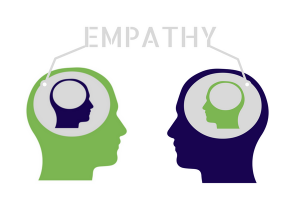Empathy: How It Can Help Us All Right Now
 In the aftermath of the most contentious election in recent history, many people are talking about the need for empathy in order to heal our divided nation. Facebook posts are flying around that charge us to rise above the rancor and offer empathy to those with whom we disagree. Just recently, Meryl Streep spoke to the value of empathy in her acceptance speech at the Golden Globe Awards. So what specifically is empathy and how do we create more of it? And what if it’s not fair; what if we give empathy but they don’t (whether they are our friends on the other end of the political spectrum or our partner on the other side of the bed)? Everybody wants to be respected and cared about, but do we all know how to dish it out – to respect and care about people when they are doing and saying things that cause us distress? If we make a commitment to offer empathy, will it really make a difference? Will it create peace and understanding in our country (and our relationships)?
In the aftermath of the most contentious election in recent history, many people are talking about the need for empathy in order to heal our divided nation. Facebook posts are flying around that charge us to rise above the rancor and offer empathy to those with whom we disagree. Just recently, Meryl Streep spoke to the value of empathy in her acceptance speech at the Golden Globe Awards. So what specifically is empathy and how do we create more of it? And what if it’s not fair; what if we give empathy but they don’t (whether they are our friends on the other end of the political spectrum or our partner on the other side of the bed)? Everybody wants to be respected and cared about, but do we all know how to dish it out – to respect and care about people when they are doing and saying things that cause us distress? If we make a commitment to offer empathy, will it really make a difference? Will it create peace and understanding in our country (and our relationships)?
A simple definition of empathy is “the tendency to be psychologically in tune with others’ feelings and perspectives” (Chopik, O’Brien, & Konrath, 2016). In his farewell speech to the nation, President Obama quoted Atticus Finch’s famous statement on empathy: “You never really understand a person until you consider things from his point of view…until you climb into his skin and walk around in it” (Lee, 1961). It certainly makes sense that if I understand what it feels like to be you, what fears you have and what you care about, I will be kinder to you. And if you do the same for me, then we will want to help each other and we will get along well. Doesn’t everybody want that kind of reciprocity? As logical as it sounds, this prescription is not so simple to execute.
All human beings are not created equal when it comes to the capacity for empathy, according to scientists. Some of our brains are wired to be more sensitive to others’ feelings and perspectives than others (Acevedo et al, 2014). In addition to variations in our personal dispositions, the culture we are raised in has an impact on our ability to feel empathy for others (Chopik, Obrien, & Konrath, 2016). The science of empathy is a hot topic. There is even new research that shows how a brain can be manipulated to increase empathy (Christov-Moore & Iacoboni, 2016). Perhaps a quick look at some of the latest findings can help us move forward in our quest to advance goodwill.
It may seem that the ability, even the desire, to empathize differs along political party lines, but that broad idea is not proven in science. Studies have shown psychological differences between those who identify as “liberals” and those who identify as “conservatives” (Laber-Warren, 2017), but I want to steer away from any conversation that reinforces that rift right now. There is plenty of other interesting research that can shed light on the mechanics of empathy and help us use it.
One lens through which to view differences in empathic potential is sensitivity. A 2014 study examined the link between empathy and sensory processing sensitivity (SPS), a trait possessed by about 20% of the human population that makes them more sensitive to social and environmental stimuli. SPS was previously measured as the Highly Sensitive Person (HSP) scale. In this context, “highly sensitive” refers to a set of traits including “identifiable genes, behavior, physiological reactions, and patterns of brain activation” (Acevedo et al, 2014). For better or worse, I count myself among these highly sensitive people. Bianca Acevedo of the Department of Psychology and Brain Sciences at the University of California, Santa Barbara, and fellow researchers, conducted a study to observe neural activity as subjects were shown photos of facial expressions conveying various emotions Their findings, published in the article “The highly sensitive brain: an fMRI study of sensory processing sensitivity and response to others’ emotions,” showed that the brains of people with this highly sensitive profile integrated more sensory information about others’ emotions than individuals without SPS. The propensity to feel more in relation to others made these people more desirous of helping them Areas of the brain involved in “emotional meaning making and empathy” were more active for these people than for their non-SPS counterparts. The researchers concluded that “the highly sensitive brain may mediate greater attunement to others and responsiveness to others’ needs” (Acevedo et al, 2014). This would seem to mean that empathy is somewhat easy for 20% of us, but not as automatic for the other 80%.
In addition to genetic sensitivity, there are other factors in our varying capacities to attune to others’ feelings and perspectives. The type of society we are born into also has an impact on how empathic we are. Another group of researchers studied empathic concern across 63 countries and found that different cultures produce people with different levels of dispositional empathy. William Chopik and his colleagues surveyed 104,365 adults from around the world and found many relevant comparisons in human beings’ orientation toward empathy. Some findings confirmed previous studies, such as the result that women reported higher empathic concern than men and older people scored higher on empathy than young people did. But the researchers’ new finding was that the countries with the highest levels of “collectivism, agreeableness, conscientiousness, self-esteem, emotionality, life satisfaction, and prosocial behavior” had the highest levels of empathy (Chopik, O’Brien, & Konrath, 2016). People who live in societies with interdependent social structures are better groomed to be prosocial, to volunteer, help others and empathize. The highest scoring countries were Ecuador, Saudi Arabia, Peru, Denmark and United Arab Emirates, and the lowest scorers were Lithuania, Venezuela, Estonia, Poland and Bulgaria (Chopik, O’Brien, & Konrath, 2016). This study points to a possible empathic disadvantage for those people who live in individualist cultures, like the United States with our American dream and its capitalistic underpinnings. Is there a way to increase empathy when it is not being developed to its full potential?
A new scientific possibility for enhancing empathic behavior was revealed in 2016 by two researchers from the UCLA Brain Research Institute and David Geffen Medical Center. Leonardo Christov-Moore and Marco Iacoboni conducted a study to observe the relationship between the neural connections activated in the brain when individuals are attuned emotionally to other people (a state they term “self-other resonance”) and prosocial decision making. Some of their general findings were consistent with Acevedo’s study of highly sensitive people in that subjects who were attuned to another’s pain tended to be more generous to that person. But this study diverged in its exploration of the “top-down” inhibition processes that determine whether we make decisions based on empathy or not. The researchers found that people who had the most activity in the prefrontal cortex, the planning and impulse-controlling center of the brain, were the least generous and those whose brains registered lots of self-other resonance and less impulse control were more generous (Christov-Moore & Iacoboni, 2016). The researchers then conducted a second study where participants underwent a non-invasive procedure which “dampened” their brains’ impulse control centers. Interestingly, these people were 50% more generous than their counterparts in the control group (Ryan, 2016). Weakening impulse control allowed some participants to act more freely on their empathic, prosocial natures. While this study illuminates a method for improving empathic expression, it seems unlikely that many people are going to sign up to undergo the procedure. But there are simpler ways to develop more empathy.
One powerful method for boosting empathy is free and available to anyone at any time. Mindfulness may well be the most effective tool any of us has for fostering internal conditions that lead to empathy. Simple practices, like bringing attention to one’s breathing or physical sensations, can invite a compassionate, timeless, worry-free space into to our minds. When our concerns and feelings, aches and emotional pains are met with our easy, mindful presence, we are attuning to ourselves, feeling ourselves. This is self-empathy, and it makes us more generous to ourselves. Such inner kindness naturally leads to greater empathy toward others (Brensilver, 2016). You can read articles and watch videos about mindfulness by clicking the link below this article.
All of us are different and some of us are more inclined to empathize than others. If you are still reading this, you are probably someone who resonates with empathy. And if it’s easy for you to imagine what it feels like to walk in another person’s shoes, you may feel hurt and frustrated if that other person doesn’t try to imagine what it’s like to walk in your shoes. This is understandable. But there is no way to make someone else more empathic. The good news is that regardless of what they do, we all have the power to make our lives more empathic and harmonious.
No matter where we are on the political spectrum, wherever we live, we are all striving every day to live the best life we can, to contribute to the causes we believe in, to be safe and to take care of the ones we love. We work hard. We suffer losses. We feel stress. We can all use some empathy. So let’s give it to ourselves. Let’s start there, for today. Let’s pay attention to the outer world and do what we can to make it better, but let’s stay attuned to ourselves in the process. Maybe as we are kinder and more caring toward ourselves, we will spend less time focusing on the objectionable behavior of others and more energy taking productive actions. Maybe soon, we will realize we are beginning to regard those others with more empathy and less judgment. And maybe at some point, we will look out and see more empathy in the world around us, even from them. It’s worth a try. Friends accuse me of being too optimistic, but I think this strategy is empirically smart. The worst case scenario is a lot of self-empathy, and the best case scenario is great relationships and a world that works for everyone.
References
Acevedo, B. P., Aron, E. N., Aron, A., Sangster, M.-D., Collins, N. and Brown, L. L. (2014), The highly sensitive brain: an fMRI study of sensory processing sensitivity and response to others’ emotions. Brain Behavior, 4: 580–594. doi:10.1002/brb3.242
Brensilver, M. (2016, March 20). Mindfulness and empathy. Retrieved January 11, 2017, from Foundational Concepts, http://www.mindfulschools.org/foundational-concepts/mindfulness-and-empathy/
Chopik, W. J., O’Brien, E., & Konrath, S. H. (2016). Differences in Empathic concern and perspective taking across 63 countries. Journal of Cross-Cultural Psychology. doi:10.1177/0022022116673910
Christov-Moore, L. and Iacoboni, M. (2016), Self-other resonance, its control and prosocial inclinations: Brain–behavior relationships. Hum. Brain Mapp., 37: 1544–1558. doi:10.1002/hbm.23119
Laber-Warren, E. (2017). Unconscious reactions separate liberals and conservatives. doi:10.1038/scientificamericanmind0912-22
Lee, H. (1961). To kill a mockingbird. New York, NY: Harper & Row, [1991].
Ryan, L. (2016, March 18). Why ARE some people nicer than others? It’s all in their brains! dailymail.co.uk. Retrieved from http://www.dailymail.co.uk/health/article-3499094/Why-people-nicer-s-brains-altruistic-hardwired-selfless.html
(For more on mindfulness, click here)
Tags: communication, cultivating mindfulness, empathy, mindfulness, self development, self-awareness, self-understanding










Great article, Maureen. Interesting and lots of recent researh. I also liked seeing your references! Thanks
I have grave concerns about the issues of empathy and mindfulness.
Empathy is reserved for women. There is an enormous “gender empathy gap”, men’s issues are dismissed as “tough luck”, I see women in the media talking about men’s mental health issues and doing the pretend boo-hoo thing or mime the world’s smallest violin. This is the sort of behaviour I encountered with 12 year old playground bullies but when it comes from educated respected adult women I can see just how deeply the societal contempt for men’s mental health has soaked into our society. A depressed man is told to “man up” in the same sentence as being told that men are inferior. Mixed messages but all of them insulting. If we have a problem its our fault. If women have a problem that’s our fault too. Empathy? Not for boys. We are on our own and no one cares.
Mindfulness? I have asked many people to explain how that is different from merely doing nice things which distract you from your problems for a while. That’s fine (I do it) but why the fancy title and accompanying industry?
Practicing self-compassion and loving kindness meditation have been very effective in helping me generate warm-hearted affection for myself and others. One of my teachers calls compassion “the yummy-yummy feeling,” and she’s right!
[…] Photo Credit: Psych Alive […]